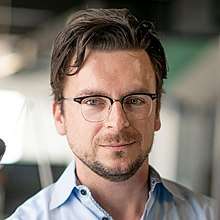Florian Neukart
Florian Neukart is an Austrian computer scientist, mathematician, and scientific author. He is known for his work in the fields of quantum computing and artificial intelligence, particularly on how to reverse-engineer the mind by gradually replacing the biological brain with artificial components, such as quantum nano-bots, electrodes, or a neural lace. In his work, he describes methods for interpreting signals in the human brain in combination with paradigms from artificial intelligence, allowing for the creation of artificial conscious entities (ACE).[1][2]
Florian Neukart | |
|---|---|
 Florian Neukart, 2020 | |
| Born | 5 May 1982 |
| Nationality | Austrian |
| Alma mater |
|
| Known for |
|
| Awards |
|
| Scientific career | |
| Fields | Computer Science, Physics, Mathematics, Computational Neuroscience, Psychology |
| Institutions |
|
| Thesis | System Applying High Order Computational Intelligence in Data Mining and Quantum Computational Considerations Concerning the Future of Artificial Intelligence (2013) |
| Doctoral advisor | Sorin-Aurel Moraru |
Biography and work
Florian Neukart holds a Ph.D. in quantum computing and artificial intelligence from the Transilvania University of Brasov, as well as a master's degree in information technology from the CAMPUS02 University of Applied Sciences in Graz, and a master's degree in computer science from the Joanneum University of Applied Sciences in Kapfenberg. He works as Director, Advanced Technologies and IT Innovation at Volkswagen Group of America, where he is concerned with research in the fields of quantum computing,[3][4] quantum machine learning,[5] artificial intelligence,[6][7] and materials science.[8][9] Neukart, born in Bruck/Mur, is also a member of the World Economic Forum's global future council on quantum computing,[10] and an assistant professor for quantum computing at Leiden University.[11][12][13]
He is the author of the books "Reverse Engineering the Mind Consciously Acting Machines and Accelerated Evolution", where he elaborates on establishing a symbiotic relationship between a biological brain, sensors, AI and quantum hard- and software, resulting in solutions for the continuous consciousness-problem as well as other state of the art problems, and "Humankind's Hunger for Energy: The journey of a million years, from using flints to harvesting galaxies", where he describes the evolution of humankind in terms of its energy consumption.
His research continues to attract considerable public international attention.[14][15][16][17][18][19][20] He was one of the first researchers to propose and implement quantum neural networks.[21] He is a pioneer in applied quantum computing and among the first ones to solve real-world problems of society and environment by means of quantum computing.[22][23][24][25] He was the first one to have introduced practical quantum computing in academic education worldwide.[26] Neukart was awarded by the Science Park Austria for his work in biologically-inspired artificial intelligence software.[27]
References
- "Unsterblich dank Quantenbewusstsein?". ORF. 14 April 2017. Retrieved 16 April 2017.
- "Dimensionen – die Welt der Wissenschaft". ORF. 14 April 2017. Retrieved 16 April 2017.
- Neukart, Florian; Compostella, Gabriele; Seidel, Christian; von Dollen, David; Yarkoni, Sheir; Parney, Bob (2017). "Traffic Flow Optimization Using a Quantum Annealer". Frontiers in ICT. Frontiers in Information and Communication Technology. 4. arXiv:1708.01625. Bibcode:2017arXiv170801625N. doi:10.3389/fict.2017.00029.
- "VOLKSWAGEN GROUP AND GOOGLE WORK TOGETHER ON QUANTUM COMPUTERS". Volkswagen. Retrieved 13 Jan 2018.
- Neukart, Florian; von Dollen, David; Seidel, Christian; Compostella, Gabriele (2018). "Quantum-enhanced reinforcement learning for finite-episode games with discrete state spaces". Frontiers in Physics. 5. doi:10.3389/fphy.2017.00071.
- "Interview: Data Science in der Automobilbranche". Data Science Blog. 27 March 2017. Retrieved 26 May 2017.
- "Artificial Intelligence and Data Science in the Automotive Industry". Data Science Blog. 27 March 2017. Retrieved 26 May 2017.
- "VW researchers use quantum computing for ev battery research". Engadget. 8 June 2018. Retrieved 18 August 2018.
We are working hard to develop the potential of quantum computers for Volkswagen
- "Volkswagen Turns To Quantum Computers For Advanced Battery Research". Clean Technica. 18 June 2018. Retrieved 18 August 2018.
We are working hard to develop the potential of quantum computers for Volkswagen. The simulation of electrochemical materials is an important project in this context.
- "Florian Neukart". World Economic Forum. Retrieved 26 April 2020.
- "Florian Neukart". Leiden University. Retrieved 18 August 2018.
- "Wahrsager, nur in seriös". Die Zeit Online. Retrieved 26 May 2017.
- "Volkswagen trials quantum computer". Springer. 2017-03-23. Retrieved 26 May 2017.
- "D-Wave Opens Quantum-Computing Resources to Coronavirus Research". The Wall Street Journal. 1 April 2020. Retrieved 26 April 2020.
- "Volkswagen scientists use quantum computing to help solve traffic chaos". Motoring Research. 7 December 2019. Retrieved 26 April 2020.
- "Volkswagen hopes to end congestion with Google quantum computers". Green Car Congress. 6 December 2019. Retrieved 26 April 2020.
- "Volkswagen forscht mit Googles Quantencomputer". Frankfurter Allgemeine Zeitung. 7 November 2017. Retrieved 13 Jan 2018.
- "Volkswagen hopes to end congestion with Google quantum computers". Computerworld. 10 November 2017. Retrieved 13 Jan 2018.
- "Quantencomputer zur Verkehrsfluss-Optimierung – Forschungsprojekt erfolgreich". Internationales Verkehrswesen. 30 March 2017. Retrieved 26 May 2017.
- "Mit Quantencomputer gegen Verkehrskollaps". 20min.ch. 20 March 2017. Retrieved 26 May 2017.
- Neukart, F (2014). "Operations on Quantum Physical Artificial Neural Structures". Procedia Engineering. 2 (1): 1509–1517. doi:10.1016/j.proeng.2014.03.148.
- "The Beginnings of a Quantum Leap". Volkswagen AG. Retrieved 16 April 2017.
- "Volkswagen erprobt Quantencomputer". Springer. 22 March 2017. Retrieved 16 April 2017.
- "Mit Quantenteilchen gegen das Verkehrschaos". Handelsblatt. 13 March 2017. Retrieved 16 April 2017.
- "Volkswagen: Quantencomputer im Einsatz gegen den Stau". Computer Bild. 21 March 2017. Retrieved 16 April 2017.
- "Students are programming with qubits". University of Leiden. Retrieved 17 April 2017.
- "Inhalierbarer Impfstoff siegt beim Ideenwettbewerb 2014". Science Park Austria. 3 April 2014. Retrieved 17 April 2017.